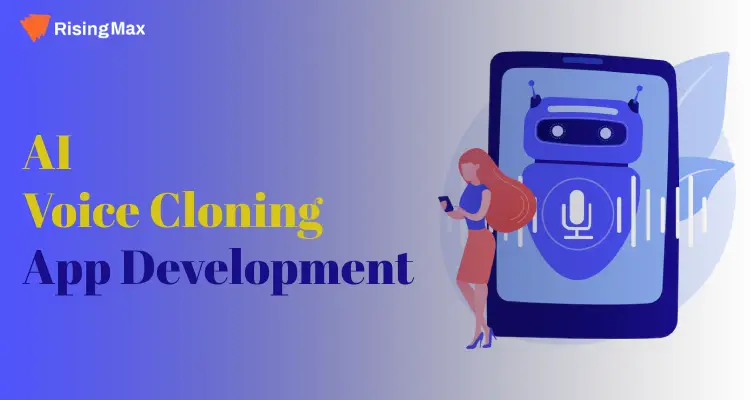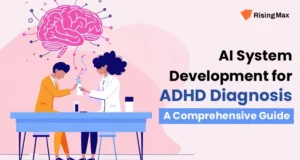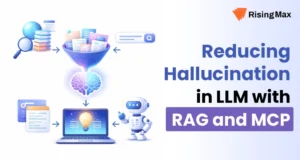Breakthrough innovation in the form of AI voice cloning app development is taking the field of communication by storm in the fast-growing tech landscape of our times. Through AI voice cloning, an artificial replica of a person’s voice is created using AI algorithms. Many industrial domains, including entertainment, customer assistance, and accessibility, have welcomed this advancement.
RisingMax’s AI voice cloning app development is based on advanced machine learning techniques, particularly deep learning neural networks. The process typically involves two main steps: training and simulation. During the training phase, the neural network embeds the individual’s voice into the circuitry by processing the audio data. This data is then used to create new audio streams that are the person’s voice or something similar.
Applications Of AI Voice Cloning App Development
Studies show that voice-cloning AI apps have become multifunctional and successfully work in various spheres. Voice cloning technology in the movie domain often helps film producers preserve the voice of actors who have passed away and lend it their memorable voice for future projects. Furthermore, AI voice cloning has been pivotal in audiobooks and voice-acting due to the fact that it has made it possible for writers and content creators to offer their audience an immersive and engrossing experience.
The core application of AI voice cloning technology lies in Text-to-Speech (TTS) synthesis. The brain of this technology reads written text and replaces it with spoken words, making the app similar in sound to the deceased person’s voice. As a result, these algorithms have led to the rise in realisticness and perfection of the cloned voice by learning the original speaker’s intonation and pronunciation patterns.
AI voice cloning becomes feasible for providers of personal services such as customer care. It is corporations that empower voice identification tools to create virtual ticketing assistants that help with personalized client needs. Consequently, the entire management process is accelerated, leading to a decrease in the number of agents requiring employment. Apart from that, artificial intelligence voice cloning for people with speech disabilities is a great way for them to communicate easily.
Experience Seamless Innovation with AI Voice Cloning App Development
Elevate your app’s capabilities with cutting-edge AI voice cloning technology. Unlock a new realm of user interaction and engagement. Let’s build your app’s future today.
Benefits Of Using AI Voice Cloning Apps
AI voice cloning tech introduces many upsides, e.g., the environment for protecting and regenerating priceless voices for the most vulnerable, who greatly depend on history or culture. Imagine hearing a voice so precious that it has vanished or a legendary person’s voice. AI voice cloning, of course, extends to the entirety of content creation and personal configuration dimensions.
In addition, AI voice cloning boundaries may spare various companies time and money. For instance, voice cloning reduces the burden of dubbing and localization by eliminating the need for human voice actors to dub the dialogue. Hence, this will lessen production costs and speed up production.
Personalized Virtual Assistants
AI voice cloning apps help build customized virtual assistants or AI chatbots with custom voices. This achievement improves users’ experience by making interactions more immersive and empathetic. Likewise, people can use a virtual assistant who sounds exactly like a loved one or a famous celebrity, improving the user experience.
Accessibility For Individuals With Speech Impairments
AI voice-cloning technology may synthesize voices for people who cannot speak. Such apps will let you create voices that resemble you or choose the voice you wish to use in communication so you can better express yourself.
Customized Content Creation
Content originators like podcasters, YouTubers, and voice-over artists can use AI synthetic voice clones for narration or character rendition. This decreases the time and monetary resources spent on content development while preserving the option of multiple-voice performances in advance for projects on a tight schedule or a shoestring budget.
Localization & Global Reach
AI voice cloning apps help utilize localization by delivering voice synthesis in different languages and accents. They specifically benefit organizations venturing into international markets or targeting diverse demographic audiences. AI-enabled voice recognition opens up a new avenue for businesses to offer localized content quickly and improve global audiences’ experience.
Preservation Of Cultural Heritage
AI voice cloning technology allows the voices of individuals, including specters of the past or heritage languages, to be preserved for educational and cultural purposes. Through digitization and replication, the future generation can engage with the voices of significant figures from the past or listen to endangered languages, which contributes to preserving the richness of culture and diversity in language heritage.
Innovative Marketing & Branding
Companies leverage AI voice cloning apps to create innovative marketing campaigns and brand experiences. Businesses can establish a unique brand identity and strengthen customer engagement by developing branded voices for virtual assistants or interactive advertisements. Additionally, AI-generated voices can be used in personalized marketing messages, enhancing the overall customer experience and driving brand loyalty.
Steps To Develop An AI Voice Cloning App
Developing an AI voice cloning app involves a series of essential steps, and each task needs to be well thought out and expertly done. At RisingMax, we develop an AI voice cloning app capable of synthesizing natural-sounding speech in various voices.
- To begin the data acquisition, we compile various recordings that could later be utilized to train the AI model. This corpus can be expanded to include various accents, ages, and genders to make the model capable of handling a wide range of voices.
- Preprocess the audio data to normalize the registers, remove the noise, and then segment them into more digestible units (e.g., sentences or paragraphs).
- Subsequently, the experts in our team will select extra models for tasks like speaker embedding (such as pre-trained speaker recognition models) or utterance-to-speech (henceforth known as TTS) generation.
- We fine-tune the model parameters to capture the various voice anomalies correctly and precisely. We also evaluate the training process for adverse outcomes and contingencies as required.
- Analyze your training model output based on metrics like the mean opinion score (MOS), perceptual evaluation of speech quality (PESQ), or the listener’s preferences.
- We have a team dedicated to designing and implementing an interface that will be user-friendly for you. The interface of the virtual assistant should be where the user can input the text and choose the voice characteristics (e.g., gender, age, accent).
- We also integrate the voice cloning model into the app’s front and back end to smooth two-way communication between the front and underlying models.
- Thus, we propose that AI voice cloning software be available from platforms like mobile devices, web browsers, or standalone applications, which you can choose to deploy. We monitor app performance and user feedback regularly to identify weak points and places where bugs are found and fixed.
Leverage RisingMax’s AI voice cloning app development to redefine user engagement and craft unforgettable interactions now.
Leverage RisingMax’s AI voice cloning app development to redefine user engagement and craft unforgettable interactions now.
Tools & Resources For AI Voice Cloning App Development
Platforms with models and libraries for supervised training are available now, facilitating the learning process to create new systems with shorter development times and fewer resources. Our AI app developers embody numerous functions and may interweave machine learning algorithms, speech synthesis, and adaptation to detail needs. Relying on open-source datasets like Mozilla Common Voice and LibriSpeech greatly contributes to training and testing.
Likewise, platform-based cloud services specific to Google Cloud and Amazon Polly use APIs that facilitate speech synthesis without extensive upfront setup. These solutions allow developers to quickly integrate voice cloning AI into their programs, allowing their applications to have this functionality. Getting into the tools, rigs, and containers is inevitable to make the best of the provided opportunities and build a stronger product development process.
Future Trends In AI Voice Cloning App Development
The AI voice cloning technology will certainly keep morphing, and several directions of its development will likely occur. By the same token, we could see the rise of more accurate and natural voice cloning results with the development of sophisticated deep learning algorithms and complex neural network configurations. This accuracy will allow the imitation of the AI voice cloning app to generate almost exactly the same voice as the speaker’s original voice.
Besides, AI voice cloning will also be blended with other cutting-edge frontline technologies as they emerge, such as virtual reality and augmented reality. This duo could generate completely realistic situations, during which people would have chances to talk with virtual characters or historical personages in an authentic manner. Additionally, over time, the possibility of voice cloning further jumps to rapid translation apps to speak in diverse languages, which can be useful to global communication.
Closure
The AI voice cloning app development has been a perfect trailblazer, taking communication to the next level and even dealing with industries by offering room for creative ideas. With the technology of AI voice cloning powered by deep-learning neural networks, the presence of apps that can come up with voice reproduction with pretty incredible accuracy is undeniable. The areas are tremendously multiple; they are entertainment, of course, customer service, and usability of the different new devices.
Although advantages arise for this technology, one must acknowledge its use’s ethical aspects and challenges to avoid abuse. As AI voice cloning is leaving a deep footprint in the field of communication, developers have to integrate the available tools, resources, and frameworks and develop new creative and effective applications that translate into the futuristic outlook of communication.














